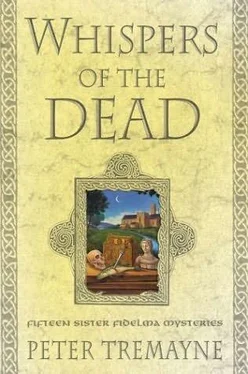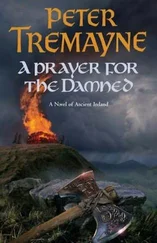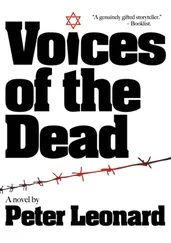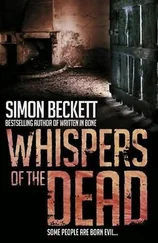Peter Tremayne - Whispers of the Dead
Здесь есть возможность читать онлайн «Peter Tremayne - Whispers of the Dead» весь текст электронной книги совершенно бесплатно (целиком полную версию без сокращений). В некоторых случаях можно слушать аудио, скачать через торрент в формате fb2 и присутствует краткое содержание. Жанр: Исторический детектив, на английском языке. Описание произведения, (предисловие) а так же отзывы посетителей доступны на портале библиотеки ЛибКат.
- Название:Whispers of the Dead
- Автор:
- Жанр:
- Год:неизвестен
- ISBN:нет данных
- Рейтинг книги:4 / 5. Голосов: 1
-
Избранное:Добавить в избранное
- Отзывы:
-
Ваша оценка:
- 80
- 1
- 2
- 3
- 4
- 5
Whispers of the Dead: краткое содержание, описание и аннотация
Предлагаем к чтению аннотацию, описание, краткое содержание или предисловие (зависит от того, что написал сам автор книги «Whispers of the Dead»). Если вы не нашли необходимую информацию о книге — напишите в комментариях, мы постараемся отыскать её.
Whispers of the Dead — читать онлайн бесплатно полную книгу (весь текст) целиком
Ниже представлен текст книги, разбитый по страницам. Система сохранения места последней прочитанной страницы, позволяет с удобством читать онлайн бесплатно книгу «Whispers of the Dead», без необходимости каждый раз заново искать на чём Вы остановились. Поставьте закладку, и сможете в любой момент перейти на страницу, на которой закончили чтение.
Интервал:
Закладка:
“I realize that. . now. The thing that had misled me was the fact that you and the real killer both shared a fear of the nature of Connla’s work. But you each took different ways of dealing with it. When the killer struck, he wanted to make it appear that Connla committed suicide and so discredit him. However, you, believing that Connla’s suicide was genuine and would bring discredit on the Faith, tried to disguise what you thought was a suicide and blamed itinerants for the murder.”
“Who killed the Venerable Connla, then?” demanded Father Máilín. “And how? There was only one key and you say that you found it in the room.”
“Let me first explain why I did not think Connla took his own life. The obvious point was that it was physically impossible for him to do so. He was old and frail. I stood on the bed and reached to the roof beam. I am tall and therefore could reach it. But for an elderly and frail man, and one of short stature, it was impossible for him to stand on the bed, tie the rope, and hang himself.
“Yet one of your brethren went to considerable lengths to draw attention to the nature of the work that Connla was doing, pretending to express approval for it but, at the same time, hinting that Connla was so overawed by his revelations that he could not face the fact of his complicity in the destruction of our ancient beliefs and rituals. He even said that Connla had approved of a quotation by Pliny which, cunningly, he left for me to find, having whetted my curiosity. It was the passage where Pliny wrote that, ‘amid the suffering of life, suicide is the gods’ best gift to men’. The murderer was Brother Ledbán.”
“Ledbán?” Father Máilín looked at her in amazement. “The Delbatóir ? But he worked closely with the Venerable Connla. .”
“And so knew all about his work. And one of the mistakes Ledbán made was in pretending he had no knowledge of Ogham when, as you yourself testify, he knew enough to accuse Connla of wrong interpretation.”
“But there is one thing you cannot explain,” Father Máilín pointed out, “and in this your whole argument falls apart. There was only one key and that you confess you found inside Connla’s room.”
Fidelma smiled knowingly.
“I think you will find a second key. What is the task of Brother Ledbán?”
“He’s the Delbatóir . . why?”
“He makes the metal book plates and book shrines, casting them from molds in gold or silver. It is not beyond his capability to cast a second key, having made a mold from the first. You simply take the key and press it into wax to form the mold from which you will make your cast. You will note, as I did, the key I found-Connla’s own key-was covered in grease. A search of Ledbán’s chamber or his forge should bring the second key to light if he does not confess when faced with the rest of the evidence.”
“I see.”
“However, it was wrong of you, Father Máilín, to try to disguise the manner of Connla’s death.”
“You must understand my position. I did believe Connla had committed suicide. If so, the nature of his work would be revealed. Would you rather Christendom knew that one of its great theologians committed suicide in protest of being responsible for the destruction of a few pagan books?”
“I would rather Christendom might learn from such an act. However, it was a greater guilt to fabricate the false evidence.”
“My desire was to save Connla from condemnation,” protested Father Máilín.
“Had Connla resorted to suicide, then he would have been condemned for his action,” Fidelma said. “What was it that Martial wrote?
When all the flattery of life is gone
The fearful steal away to death, the brave live on.
“But, as you frequently remarked, the Venerable Connla was a brave man and would have lived to argue his case had he not been murdered. I will leave it to you to arrest Brother Ledbán and await instructions from the abbot.”
She smiled sadly and turned toward the door.
“Must everything come out?” called Father Máilín. “Must all be revealed?”
“That is up to the abbot,” replied Fidelma, glancing back. “Thankfully, in this case, it is not in my purview to make such moral judgments on what took place here. I only have to report the facts to the abbot.”
THE FOSTERER
Fidelma! I am glad that you have come.”
Brehon Spélan was looking somewhat harassed as Fidelma entered the old judge’s chamber. She had known Spélan for many years and had ridden to the fortress of Críonchoill, the place of the withered wood, in answer to his summons. He had sent her a message that he required some urgent assistance. Now his face was wreathed in a tired smile of relief as he came forward to welcome her.
“What ails you, Spélan?” Fidelma examined him with concern. He did not seem physically ill and a moment later he confirmed that fact to her.
“I did not mean to alarm you, Fidelma.” He was apologetic. “I was due to hear a case this morning; a case of death by neglect and now I have been called to hear a case of kin-slaying in the neighboring territory. The kin-slaying concerns a cleric of noble rank and, as you will know, takes precedence. I am afraid that I must leave at once and yet all the witnesses of the death by neglect case have already been summoned here. It is too late to cancel the hearing. I asked you here to beg a favor of you.”
Fidelma smiled wryly.
“You want me to hear this case of death by neglect?”
“You are qualified to do so,” pointed out the elderly Brehon, as if it might be a matter for dispute.
She nodded in agreement. Being qualified to the level of anruth, only one degree below the highest the law courts could bestow, she could sit in judgment on certain cases, but her main task as a dálaigh was to prosecute or defend and, more often than not, simply to gather information for presentation to the higher courts.
“Of course I will do so. A case of death by neglect? Do you have details?”
“A father whose son has died while in fosterage brings the charge. That is all I know, except such a case should be fairly simple. I have a copy of the Cáin Íarraith, the law on fosterage, should you need it.”
Fidelma inclined her head slightly.
“I would be grateful, Spélan. While I know generalities of the law pertaining to fosterage, I may need to refresh myself on the specifics.”
The old judge moved to his table, picked up a well-thumbed manuscript book and handed it to her. He seemed in a hurry to depart for he glanced at her in embarrassment.
“Thank you for standing in for me, Fidelma. I must be on my way now. My clerk is Brother Corbb. I am leaving him behind. He will guide and advise you.”
He raised his hand in a sort of salutation, picked up the leather satchel, which he had just finished packing as she entered, and left the room.
Fidelma stood for a moment regarding the closed door with a faint smile of amusement. Brehon Spélan had not really given her time to think and she hoped that she had not been pushed into a wrong choice. She dropped her eyes to the law text that the old judge had thrust into her hand and sighed deeply. What did she really know of fosterage? She seated herself at the desk vacated by Brehon Spélan and placed the book before her.
Altram -fosterage-was the keystone of society and practiced in the five kingdoms of Éireann since remote times and by all social ranks. Children were sent to be reared and educated, and those who undertook this responsibility became foster parents of the child. Usually children were sent to fosterage at the age of seven years. They remained in fosterage until the age of fourteen, for girls, and seventeen for boys, when they were deemed to have reached the “Age of Choice.”
Читать дальшеИнтервал:
Закладка:
Похожие книги на «Whispers of the Dead»
Представляем Вашему вниманию похожие книги на «Whispers of the Dead» списком для выбора. Мы отобрали схожую по названию и смыслу литературу в надежде предоставить читателям больше вариантов отыскать новые, интересные, ещё непрочитанные произведения.
Обсуждение, отзывы о книге «Whispers of the Dead» и просто собственные мнения читателей. Оставьте ваши комментарии, напишите, что Вы думаете о произведении, его смысле или главных героях. Укажите что конкретно понравилось, а что нет, и почему Вы так считаете.












